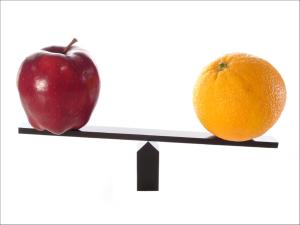 We all have been taught at certain stage that you cannot compare apples to oranges. What was usually meant by that is that the world is divided into clear categories and those categories should not be mixed up. There are Developers and there are Managers, there are First world countries and there are Third world countries, there are “winners” and there are “losers”. By conveniently dividing the complex reality into more simple and digestible parts this thumb rule clearly makes our life easier, but nevertheless – is it true?
We all have been taught at certain stage that you cannot compare apples to oranges. What was usually meant by that is that the world is divided into clear categories and those categories should not be mixed up. There are Developers and there are Managers, there are First world countries and there are Third world countries, there are “winners” and there are “losers”. By conveniently dividing the complex reality into more simple and digestible parts this thumb rule clearly makes our life easier, but nevertheless – is it true?
Well, for starters, YOU CAN compare apples and oranges! They are both fruit, they are sweet and they are of similar size. Oranges are actually called “kinds of apples” in several languages, including my own two native languages. So of course they can be compared:
- We can compare their nutritional value.
- We can compare the efficiency of their storage.
- We can compare their profitability as a possible choice to grow in our garden.
- And a hundred more possible comparisons.
So, in the language of the best Discovery Channel show ever: “Busted!”
There are many similar “thumb rules” that exist in our mind and that are similarly wrong. In reality they are Biases, whose function is to cloud your judgment rather than facilitating it. In many cases, they are just leftovers from our younger years when the best way to teach us was to say things in an absolute manner: “Don’t do that or you’ll get blind!”
As adults, though, we constantly have to deal with “incomparable” alternatives and “improbable” choices. This is especially important when discussing possible solutions to a problem. In many cases, optimal solutions lie in a different category than the problem itself.
Think about a situation when a certain department of the organization constantly fails to deliver on time, crossing deadline after deadline. Our common sense would advise us to look for possible solutions in the same category, trying to provide the department with better scheduling and monitoring. The category of the problem is Time Management, so we look for “apples from the same tree”.
However, there is a chance that not meeting deadlines is only a symptom of the real problem, which could actually lie in a sphere of Team Building and not Time Management, as it seems. There is a possibility that deadlines are being missed due to the low motivation of the team members to act in the interests of the Team. The low motivation could be a result of jammed Communication inside the Team, and their general dissatisfaction with the department’s manager.
In such cases the only solution IS to compare apples and orange, breaking the stiff boundaries of known categories. It’s important to remember that the same as we gave names to different fruits, we divide the world into categories for the sake of convenience and not necessarily because a certain division really exists in reality. The basic principle behind progress is that to make something easier you sometimes need to make it more complex.
I hope to return to this subject in my later posts, but for now I leave you with knowledge of what you should say to someone who blames you of comparing the incomparable 🙂

Sometimes the best insights come from examining things that are considered incomparable. As in your example, it can motivate you to dig deeper and find truths, or at least root causes, that were unanticipated.
But I have to disagree a bit with your statement about progress. Sometimes more progress is made by making things simpler. After all, we have all heard of the KISS principle but I can’t ever recall seeing the MICS principle!
Thank you for your comment Mark,
The KISS principle is more related to ongoing management than to achieving breakthroughs. However, when Einstein came to disrupt the perfect world of Newton, where everything was simple, being governed by three laws of Gravity – he made things much more complicated, but fostered the progress of humanity.
Some things are complex.
I can use magic as a simple answer for every mystery.
Understanding may seem to add complexity, but it also allows for control.
Apples are like oranges, but different.
They can be compared, but they should not be confused.
Exactly, this difference should not prevent us from weighing options and making decisions…